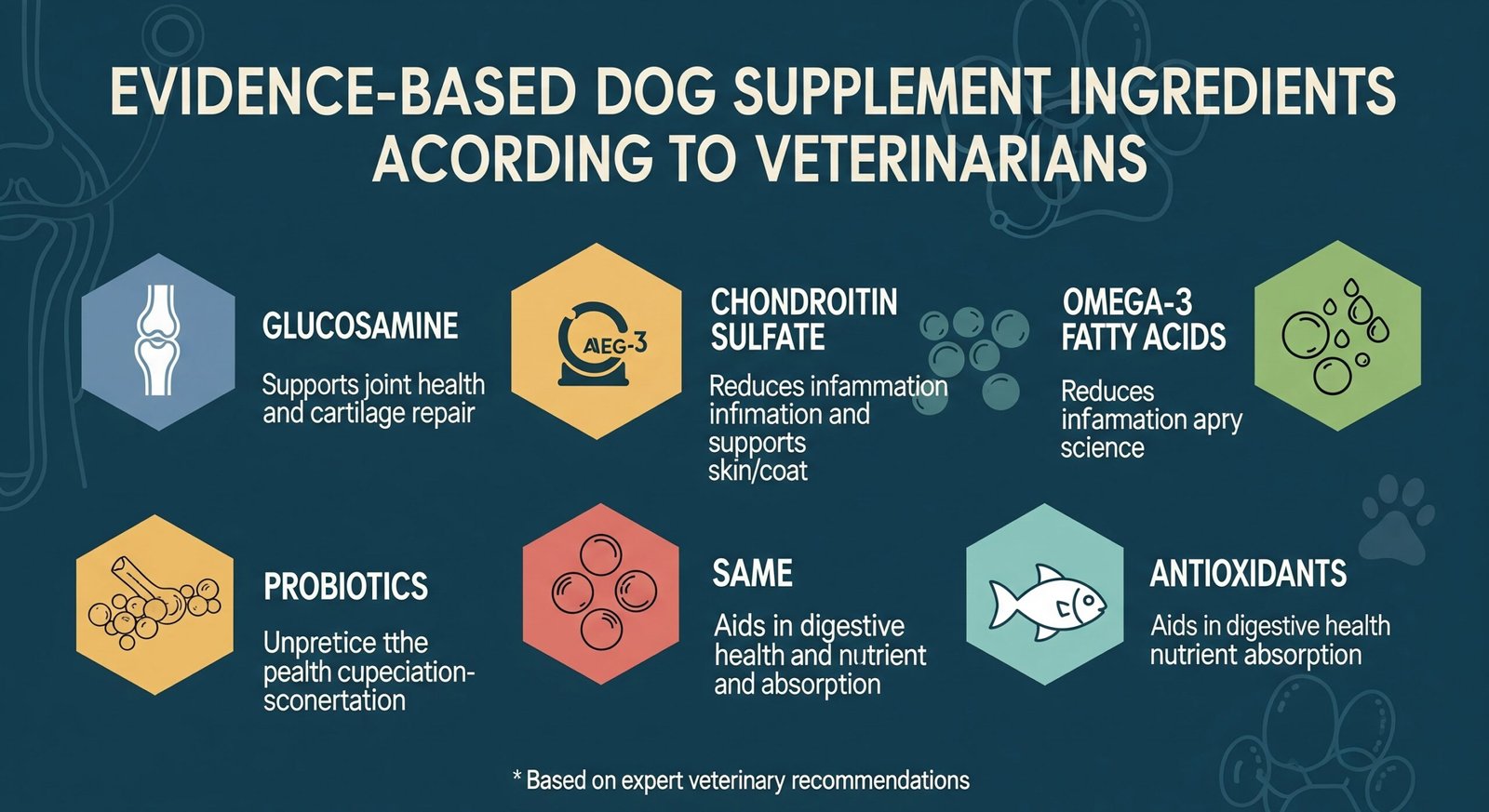Key Takeaway: Veterinary consensus supports routine use of only a handful of supplements—omega-3 fatty acids, joint nutraceuticals (glucosamine HCl, chondroitin sulfate, avocado/soybean unsaponifiables, green-lipped mussel), and probiotics—due to robust clinical and mechanistic evidence. Other popular ingredients lack the rigorous trials needed for veterinary endorsement.
1. Omega-3 Fatty Acids
Active Ingredients: Eicosapentaenoic acid (EPA) and docosahexaenoic acid (DHA)
Mechanisms and Benefits:
- Compete with arachidonic acid to produce less-inflammatory eicosanoids
- Reduce clinical signs of osteoarthritis, improve skin and coat quality, support cardiac health
Evidence Grade:
- Systematic reviews rate omega-3s as the only nutraceutical with strong randomized controlled trials in dogs.
- Prescribed therapeutic doses: 30–370 mg EPA + DHA per kg body weight daily, depending on condition severity.
2. Joint Nutraceuticals
Evidence-Based Ingredients:
- Glucosamine hydrochloride
- Sodium chondroitin sulfate
- Avocado/soybean unsaponifiables (ASU)
- Perna canaliculus (green-lipped mussel)
Mechanisms and Benefits:
- Glucosamine and chondroitin support cartilage matrix synthesis and inhibit degradative enzymes
- ASU reduces collagen degradation and inflammatory mediators
- Green-lipped mussels provide additional glycosaminoglycans and omega-3s
Veterinary Evidence:
- Clinical trials demonstrate modest improvements in pain and weight-bearing, sometimes comparable to NSAIDs when combined with ASU (force-plate study).
- Tolerability is high; adverse events are rare (1–2% mild GI signs) in long-term use.
3. Probiotics
Active Ingredients: Multi-strain bacterial blends (e.g., Lactobacillus, Bifidobacterium species)
Mechanisms and Benefits:
- Restore and maintain gut microbial balance
- Enhance mucosal immunity and barrier function
- Adjunct management for inflammatory bowel disease, acute diarrhea, and after antibiotics
Evidence Level:
- Emerging veterinary trials support multi-strain, high-CFU formulations for prevention and treatment of gastrointestinal disorders.
- Recommended doses often exceed 10⁹–10¹⁰ CFU per day.
4. Supplements Without Routine Veterinary Endorsement
Despite heavy marketing, the following lack sufficient high-quality evidence for routine recommendation:
- Antioxidant vitamins (e.g., vitamins C and E) for healthy dogs—effects modest and condition-specific.
- Herbal extracts (e.g., turmeric/curcumin, boswellia) outside targeted pilot studies.
- Minerals (e.g., selenium, chromium propionate) for immune modulation—preliminary data only.
- SAMe (S-adenosylmethionine) for hepatoprotection—mechanism plausible but clinical trials limited.
5. Practical Veterinary Recommendations
- Omega-3 fatty acids: First-line adjunct for arthritis, dermatologic and cardiac support.
- Joint nutraceutical combinations (Glu + CS + ASU ± mussel): Use in dogs with mild–moderate osteoarthritis or as NSAID-sparing therapy.
- Probiotics: Employ in dogs with GI disturbances, antibiotic-associated diarrhea, or chronic enteropathies.
- Quality assurance: Select products with veterinary or ConsumerLab® certification to ensure label accuracy and bioavailability.
- Monitoring: Reassess clinical response after 8–12 weeks; discontinue or adjust based on efficacy and tolerability.
Conclusion
Veterinarians recommend supplements only when backed by well-designed trials and clear mechanisms. Omega-3s, select joint nutraceuticals, and probiotics meet this standard. All other ingredients require further research before routine veterinary endorsement.

